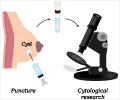There was a debate over which PSA level should lead to a biopsy recommendation after the US Prostate Cancer Prevention Trial found cancer in many men with low levels of prostate specific antigen

"Despite considerable recent debate about lowering the threshold for referring men to biopsy, we detected no change toward more aggressive biopsy referral practices in data spanning more than a decade for one integrated delivery system," says lead author Steven Zeliadt, PhD, of the Department of Veterans Affairs Medical Center in Seattle, Washington. "In fact, we observed an opposite pattern, with biopsies becoming slightly less common over the study period. This may reflect growing awareness of the problems of overdiagnosis and overtreatment—and the fact that many men die with prostate cancer but not from it."
Controversy is longstanding about what PSA threshold should be used to refer men for biopsy. The generally accepted standard is 4.0 ng/mL. However, some have urged lowering the level to 2.5 ng/mL, abandoning a specific cutoff altogether, or measuring the PSA velocity, or change over time, instead of absolute level. Dr. Zeliadt and his colleagues set out to determine if the actual biopsy referral practices in a community setting had changed in response to new recommendations, and to determine if PSA velocity is associated with follow-up biopsy.
The study examined PSA tests in members of Group Health, a health plan in Washington State and Northern Idaho, between 1997 and 2008. The final sample included 111,369 index tests among 54,831 subjects. For each test, the study evaluated the PSA level and velocity and the specific follow-up: receiving a biopsy within a year after the test date; attending a urology appointment within a year without biopsy; additional PSA testing within a year with no urology visit; and no PSA-related follow-up.
The researchers found that of tests with a PSA value greater than 4.0 ng/mL, 28% led to a biopsy within 12 months, and 38.6% were followed up by a urologist but did not result in a biopsy. Biopsies were slightly more common in the early years of the study, but biopsy rates did not differ over time for men with mild to moderate PSA levels. The threshold used for biopsy referral appeared not to change over time.
PSA velocity was strongly associated with biopsy. Among men whose PSA tests exceeded 4.0 ng/mL, those with a rapidly rising velocity were more likely to undergo biopsy. This rate was also consistent across the years of the study. "PSA velocity has been promoted for many years as having value for predicting death from prostate cancer, although several recent studies and evidence from screening trials have demonstrated that in practice, velocity adds little value. This is not surprising given that PSA is a continuous marker, and a rapid rise may be likely to trigger follow-up, thus reducing rates of death from prostate cancer," notes Dr. Zeliadt.
Advertisement
Advertisement



![Prostate Specific Antigen [PSA] & Prostate Cancer Diagnosis Prostate Specific Antigen [PSA] & Prostate Cancer Diagnosis](https://images.medindia.net/patientinfo/120_100/prostate-specific-antigen.jpg)









